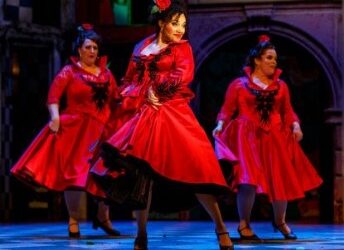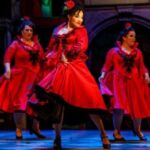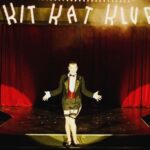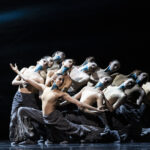Love at first sight. Old age versus youth. False identities. A self-made genius with a plan. Rossini’s comic opera, The Barber of Seville, premiered in Rome in 1816, and has been delighting audiences around the world ever since. The story (libretto by Cesare Sterbini) was adapted from a play by Pierre-Augustin Caron de Beaumarchais, who also wrote the play on which Mozart’s opera, The Marriage of Figaro (premiered in 1786) was based. These comedies exemplify the egalitarian spirit of the Age of Enlightenment; the central character, Figaro, is a servant-turned-businessman whose genius thwarts the plots of those who consider themselves his “betters.”
Seattle Opera’s production, now playing at McCaw Hall, capitalizes on the pure silliness of the opera’s plot. From Count Almaviva’s dawn serenade to Rosina to the wedding celebration in the evening, the one-day progress of True Love is beset by Rosina’s guardian’s clumsy attempts to keep her all to himself, “by force or by love.”
Director Lindy Hume matches rapid-fire action, sets and choreography to the sparkle of Rossini’s music and the twists of the plot. Vivid sets and costumes, slapstick, disguises, fake identities, sight gags so fast you will miss them if you blink, and kaleidoscopic crowd scenes mirror the music. Stripes, checkerboard patterns, polka dots, and floral prints cover every surface from Rosina’s blouse to the lid of the harpsichord. The lighting expresses emotions or external conditions: a sour greenish yellow for rage or jealousy, a dynamic black and white pattern of rainy windows for a storm. Even the change from an exterior to an interior scene is choreographed and funny.
Rossini’s music is famous for its vocal fireworks, and the cast negotiates the dazzling scales and ornamentation seemingly effortlessly and with delight. Two different casts, assembled from across the US and the world, perform on alternating dates; this review addresses the artists on stage on May 5, 12, 15, and 18.
César Cortés sings poignantly as Almaviva, a man looking to be loved for himself rather than for his money. He also enacts three fake identities—a drunk soldier, a humble student, and a pious music teacher who accompanies himself on “air harpsichord”—creating distinct physical and vocal qualities for each persona.
At the center of the plot stands Figaro, an ex-servant who now enjoys the profits of his own genius. He’s happy to help the gentry with their projects, but he knows his own worth and demands it, and lets you know it from his first moment on stage, in his showy self-promotion. Luke Sutliff nails its tongue-twisting brilliance, and his body language conveys Figaro’s absolute self confidence in every scene he is in.
Rosina, although a prisoner in her guardian’s house, has a mind of her own. Mezzo-soprano Taylor Raven says Rosina “creates choice where there is none… She refuses to be forced into a life she doesn’t want.” The role takes Raven from dazzling super-high notes to the deepest parts of her powerful, beautiful voice.
Rosina’s guardian, Dr. Bartolo, would like to win his ward’s love, but is willing to have her by any means. He fancies himself as dashing, if mature, and hides his balding, graying hair under a wig that was apparently stolen from Elvis’s Las Vegas dressing room. Ashraf Sewailam conveys his smug self-entitlement, his clumsy attempts to look seductive, and his barely suppressed assumption of whiney power.
Basilio, the real music teacher (William Guanbo Su) is appropriately smarmy and supercilious as he helps Bartolo smear Almaviva. Deanne Meek nails the role of the housekeeper, Berta, with a vacuum in one hand and a cigarette in the other, mostly eavesdropping silently until her own gorgeous lament in Act 2 about dying as an “old maid,” and the self-transformation that follows.
The non-speaking servant, Ambrogio—vaguely reminiscent of Rocky Horror’s Riffraff—is played by Seattle’s own burlesque superstar, Waxie Moon (a.k.a. Marc Kenison). Moon is almost too good; it’s sometimes hard to pay attention to the main action as Moon toddles and putters in the background, and there is a hilarious moment in Act 2 when it’s impossible to look away—even as the plot is moving forward elsewhere on the stage.
Conductor Valentini Peleggi (making her Seattle Opera debut) keeps the tempo at a brisk clip that shows off the virtuosity of both singers and instrumentalists.
If you’re looking for an afternoon or evening of effervescent delight for your ears and eyes, this is the show for you. Glorious music, likeable characters (even the villains), and eye-candy sets, costumes, staging, and choreography await you. Go treat yourself.
The Barber of Seville, music by Gioachino Rossini, libretto by Cesare Sterbini. Mc Caw Hall, Seattle Center. Performances May4, 5, 10, 12, 17, 17, 18, and 19. Evening performances at 7:30PM, matinees at 2PM. Info: www: seattleopera.org
Tickets: https://www.seattleopera.org/tickets/tickets-and-packages/
Info: www: seattleopera.org


















